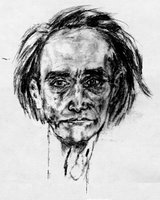
All terms coined to describe the Mexican sacred drugs, (the peyote, the teonanacatl, and ololiuqui with LSD which keeps a very narrow chemical-spiritual relationship and mode of action) are inadequate. Hallucinogen , which comes from 'freak' is associated with being crazy or wander. Humphry Osmond coined the word psychedelic ('revealing of the mind') avoid using the prefix 'psycho' to avoid linking him to the term psychotic. However, these precautions were insufficient. On the other hand, the abuse that the pop culture of the seventies made that word keeps us from holding that a shaman have psychedelic experiences . Aldous Huxley proposed use phanerothyme ('manifesting the soul') to talk about substances such as mescaline:
To make this trivial world sublime Take half a gram of
fanerotime. Entheogens
the term has been more accepted by those who study these drugs. Entheos is a word that was used to describe the state in which one finds when God has entered your body . Applied to prophetic trances, erotic passion and artistic creation, as well as those religious rites in which mystical states were experienced through substances which were transustanciales with the deity. The root gene denotes the action of becoming. In a strict sense is a term only for those drugs that produce views such as religious or shamanic rites.


